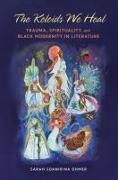Read more
"The corporeal and spiritual healing in literature by women of colors can be seen to redefine modern thought and printed text. Sarah Soanirina Ohmer traces the impact of colonization and enslavement on Black women and Black women's contributions to colonial and nineteenth century literature in the US, Brazil, and Cuba. Drawing on intersectional analysis, Ohmer focuses on portrayals of trauma and spirituality in works by Toni Morrison, Conceiðcäao Evaristo, Maryse Condâe, Gloria Anzaldâua, the Quilombhoje poets, and Marâia de los Reyes Castillo. Ohmer compares literature from different countries along four thematic pathways: ghosts, mirrors, naming, and motherhood. Her analysis unlocks the literature's power to heal through gut-wrenching descriptions of wounds and thrilling passages of hope and liberation. Throughout, Ohmer weaves in her life story as a Black woman as she reflects on how colonialism, racism, sexism, and capitalism have impacted her work, traumas, and faith journey"--
List of contents
Foreword AnaLouise Keating
Acknowledgments
Introduction: Keloids of Modernity
Chapter 1. Founders of Spiritual Transnational Homes: Black Female Trailblazers of Literature in the Americas
Chapter 2. From Metaphorical Conjure Women to Conjure Theory: Intersectional Approaches to the Study of Modernity and Trauma in the Americas
Chapter 3. Listening to Spirit and Healing Inherited Trauma
Chapter 4. Picking Up the Pieces: Anti-Naming and Postslavery Shock
Chapter 5. “And Now We See”: Breaking Down Mirrors of Internal Colonization
Chapter 6. Recovering from (m)Otherhood: Reframing Displaced Maternal Identities
Conclusion: Healing Love
Notes
Bibliography
Index
About the author
Sarah Soanirina Ohmer

